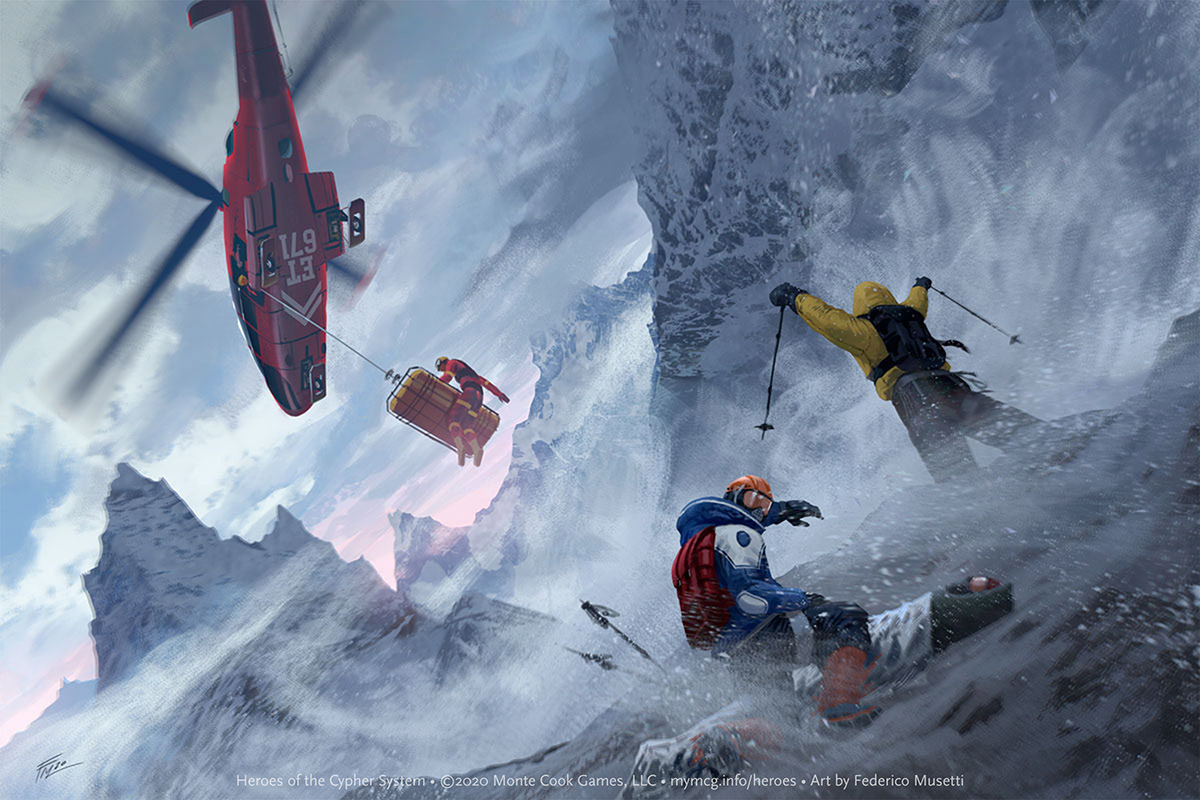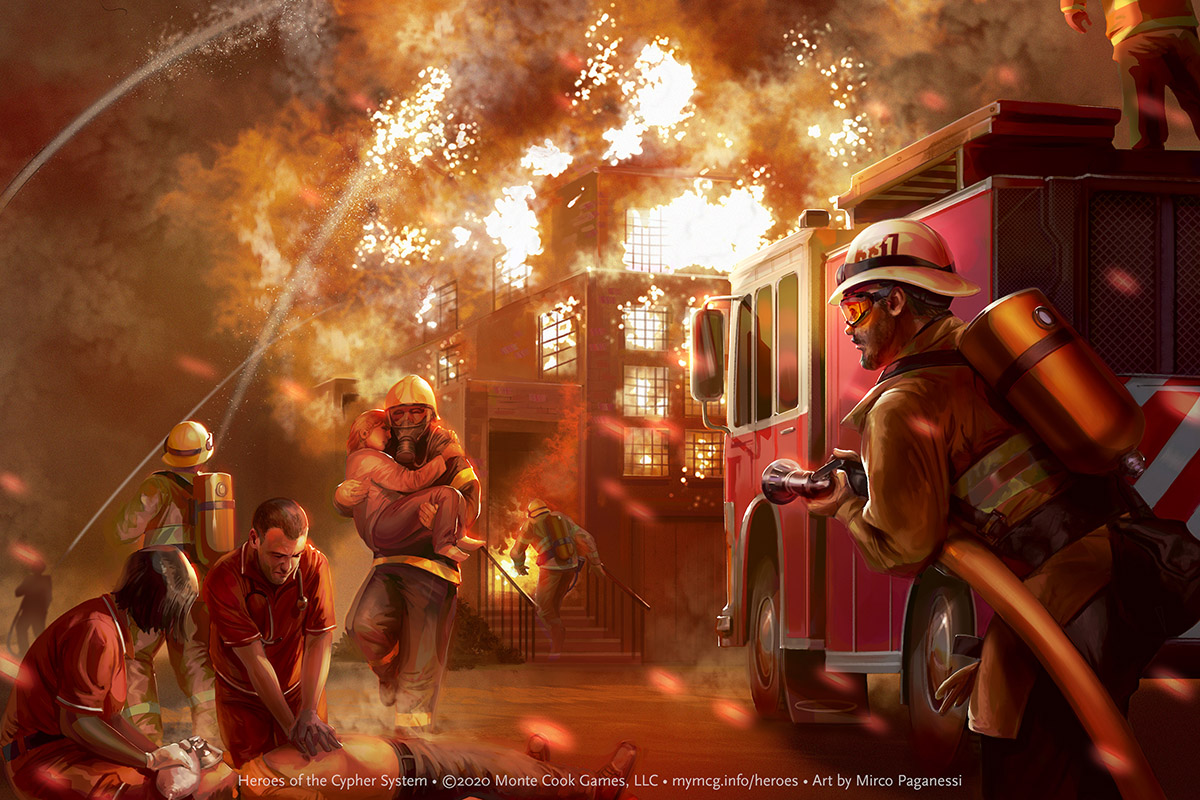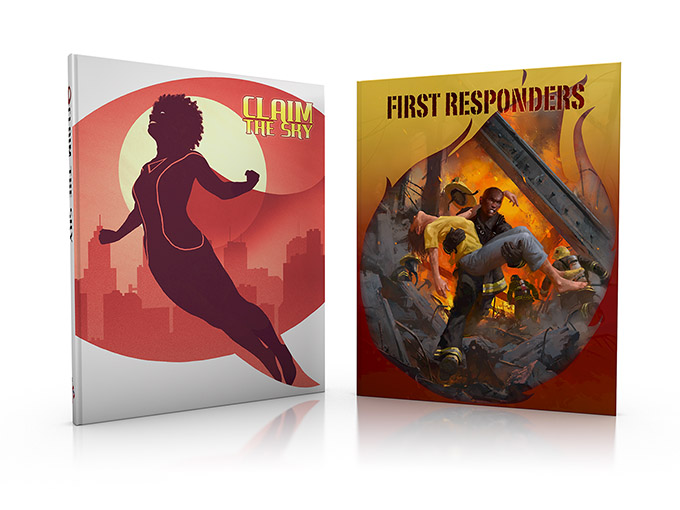First Responders promises to make scenarios dealing with a major crisis or disaster as gripping as any other RPG scenario.
This section, taken from the rough draft of the current manuscript, suggests how that’s done.
Beyond this general introductory section, each type of crisis will be presented in detail, with its own goals and encounters as well as all the information needed to run it as a complete scenario (or multiple scenarios) and engage with it as a player character (PC).

Goals
Goals are kind of like “victory conditions.” In a fantasy RPG adventure, for example, the goal might be “slay the dragon” or “recover the magic ruby.” They’re pretty straightforward and they allow the players to know if they succeeded or failed.
In First Responders, the kinds of missions the PCs undertake can present goals that seem more nebulous (do something to help the victims of that earthquake) or far too large (contain that massive wildfire). Thus, we have to develop a new way of looking at goals for the PCs.
Every mission the PCs embark upon should have either an achievable goal or an amalgamated goal, or perhaps both.
Achievable Goal
You and your team can’t actually stop a hurricane or extinguish the entire wildfire that is currently engulfing thousands of acres. These are not achievable by a group of PCs (or in some cases by anyone in a realistic setting).
So what each mission does have is a specific, achievable goal. A few examples help shed light on what this means.
Hurricane: Save the seven families that remain trapped in a small coastal town.
Building Collapse: Locate the six individuals still missing before the structure collapses any further.
Epidemic: Locate the original source of the outbreak.
Lost in the Wild: Find the three lost hikers before the blizzard moves in, and get them off the mountain to safety.
The achievable goal is always specific and measurable, so the players know when the mission is over.
Amalgamated Goal
A mission can also have an amalgamated goal. This can be in addition to, or instead of, an achievable goal.
The amalgamated goal is to accomplish a certain number of small victories that add up to an overall victory. The PCs might not be able to stop the volcano from erupting, but they can build a number of trenches to control (or slow) the lava flow, evacuate a certain number of people, and save a research team trapped by an avalanche of rock and lava. Essentially, the scenario provides a number of points to each action that the PCs might take. The accumulated total represents the ongoing effort put forth. Lots of little “battles” can win the “war.”
In a scenario with both types of goals, the PCs track their total amalgamated score, but the actions dictated in the achievable goal must be a part of that total.

Encounters
Of course, not everything in a crisis is straightforward or easy. Nature (or whatever caused the disaster) throws a few curve balls at those who stand against it. As the PCs make and enact their plans to achieve their goals, encounters present situations that they must contend with. Some might be expected, and others might not.
Challenge Encounters
A challenge encounter typically involves a single task, although there may be many actions needed to complete the task. Sometimes, the challenge itself is hard, like lowering a stretcher from a helicopter in high winds. Sometimes, the challenge isn’t all that difficult, but it must be completed quickly, like organizing the locals to build a sandbag wall to keep back the rising floodwaters.
Unexpected challenge encounters often come in the form of GM intrusions. A fallen tree blocks the only road out of a remote, heavily forested area. An aftershock further threatens the collapse of a building the PCs are in while looking for earthquake survivors. An angry mob gathers around the health care workers during a viral outbreak. The levy breaks.
The Cypher System, with GM intrusions and PC use of effort, is uniquely suited to creating a tense, action-packed, and thrilling narrative in such encounters.
Contested Encounters
In a contested encounter, the challenge is a direct threat and the PCs face it head on. In a typical RPG adventure, a contested encounter would be a fight. The PCs run afoul of a hideous beast or a nasty enemy and combat ensues. In First Responders, we take that same general idea but we apply it far more broadly.
Sometimes, a contested encounter might indeed be an actual physical fight. Rescue workers contending with a hurricane in southern Florida might have to deal with alligators, for example. Even then, however, the fight probably isn’t like those you’d have in other RPG situations, because the workers aren’t likely interested in killing the gators, and they probably don’t have straightforward weapons anyway.
But perhaps most interesting are the contested encounters that basically treat a part of the crisis as a “creature.” The most straightforward example would be in a large building fire. A small portion of the fire will be given stats more or less like a Cypher System creature—a level, health, damage inflicted, and so on. Round by round, the characters fight the fire, using fire extinguishing equipment or tactics, while the fire moves, burns, flares, chokes and does all the dangerous things a fire can do. In a whole scenario, the PCs might have to battle many different such fires, and they’re not all the same based on intensity and the surrounding environment (a fire near a pile of dirty rags is more dangerous than one just burning up the wall, but the one near the propane tank is worse still).
Some contested encounters within certain crises will become very abstract. In a flood, the floodwaters might be given a level, and it’s in fact the banks of the river that take the damage it inflicts. A sandbag wall might provide armor. In an epidemic, the virus is an abstracted “creature” spreading, and the only way to damage it is to keep people from spreading it while at the same time administering a vaccine. In these more abstracted contested encounters, the time frame becomes very different from a standard Cypher System battle, and a “round” might last hours, days, or even weeks. The thing to remember, though, is that all the same principles apply. The PCs act, and then their opponent acts. Attacks are made, effort is used, damage is inflicted, armor is taken into account, effects take hold, and so on. Each type of crisis will offer its own unique take on these kinds of encounters.
And obviously, just like in any encounter, GM intrusions (and of course, player intrusions) can significantly alter the flow of the story, making things more exciting and more challenging.
First Responders is just one of the titles featured in the Heroes of the Cypher System Kickstarter!
